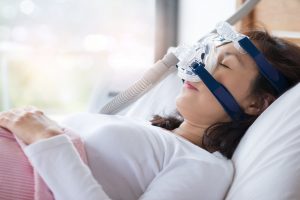 Sleep apnea (OSA) is a condition that is highly under-recognized and undertreated in people with heart disease and high blood pressure. A new scientific statement helps shed light on the condition and the increased awareness that healthcare experts are urged to take in patients with the common conditions.
Sleep apnea (OSA) is a condition that is highly under-recognized and undertreated in people with heart disease and high blood pressure. A new scientific statement helps shed light on the condition and the increased awareness that healthcare experts are urged to take in patients with the common conditions.
The statement published in the American Heart Association’s journal Circulation estimates that 40% to 80% of people with cardiovascular disease have sleep apnea. This common sleep condition includes symptoms such as snoring, lapses in breathing, fragmented sleep, and daytime sleepiness. Approximately 34% of all middle-aged men and 17% of middle-aged women meet the criteria for OSA.
Advertisement
Risk factors for OSA include large neck circumference, obesity, craniofacial abnormalities, family history, smoking, and nighttime nasal congestion. It’s often associated with several cardiovascular complications such as high blood pressure, heart failure, atrial fibrillation, coronary artery disease, pulmonary hypertension, and type 2 diabetes.
“Obstructive sleep apnea can negatively impact patients’ health and increase the risk of cardiovascular events and death. This statement is to encourage increased awareness, screening and treatment as appropriate for sleep apnea,” said Chair of the scientific statement writing group Yerem Yeghiazarians, M.D., FAHA.
Screening for OSA
There is no consensus among experts that screening for OSA can alter clinical outcomes, but the number of patients with cardiovascular disease who have the sleep disorder is reason enough alone to provide screening and treatment. Doctors report that patients who get treatment for OSA report better mood, less snoring, less daytime sleepiness, and improved quality of life and work productivity.
Yeghiazarians explained, “In addition, screening advances have changed how we diagnose and treat obstructive sleep apnea. For example, many patients do not have to go to an overnight sleep study center anymore. The FDA now approved sleep devices that patients use at home and send back to their doctor for assessment. And, while a continuous positive airway pressure (CPAP) machine is one form of treatment, there are numerous therapeutic options – from positional therapy and weight loss to oral appliances and surgery – depending on the cause and severity of someone’s OSA.”
With the possibility of OSA worsening heart disease, many experts agree that it’s vital for patients to be screened for the sleep disorder. With improved detection devices and easy lifestyle options to treat OSA, it’s a condition that is easily caught and treated. However, as this statement outlines, more health care professionals need to increase awareness of sleep apnea.
